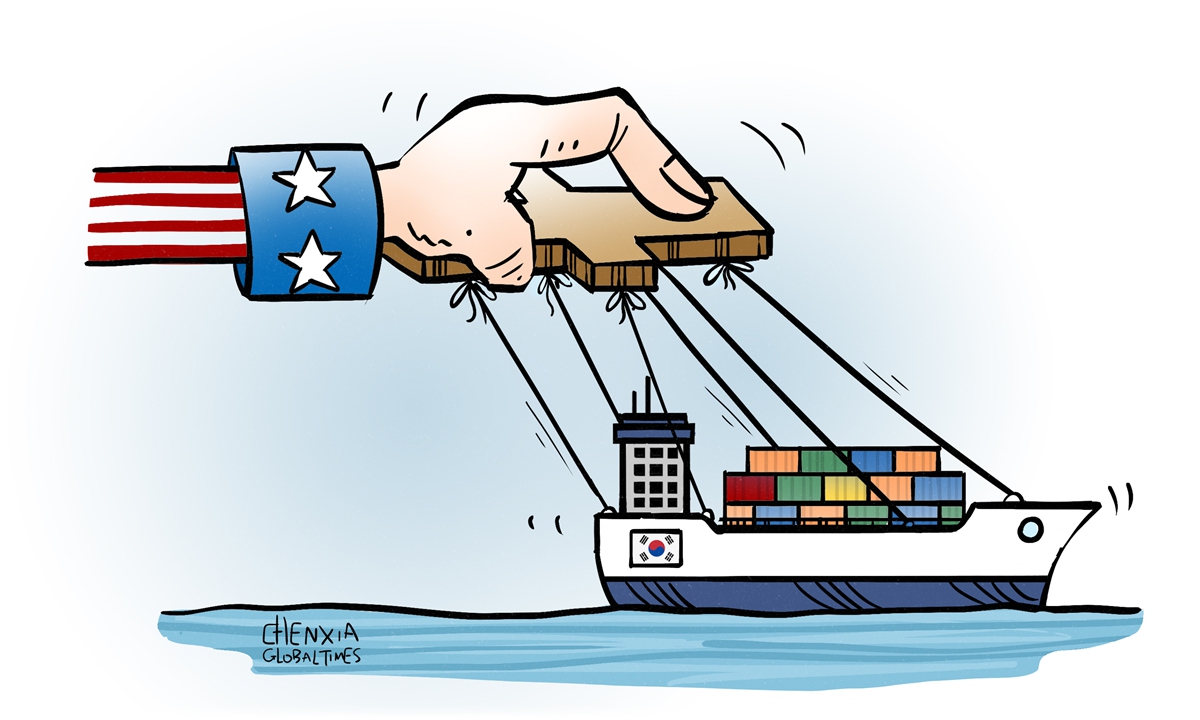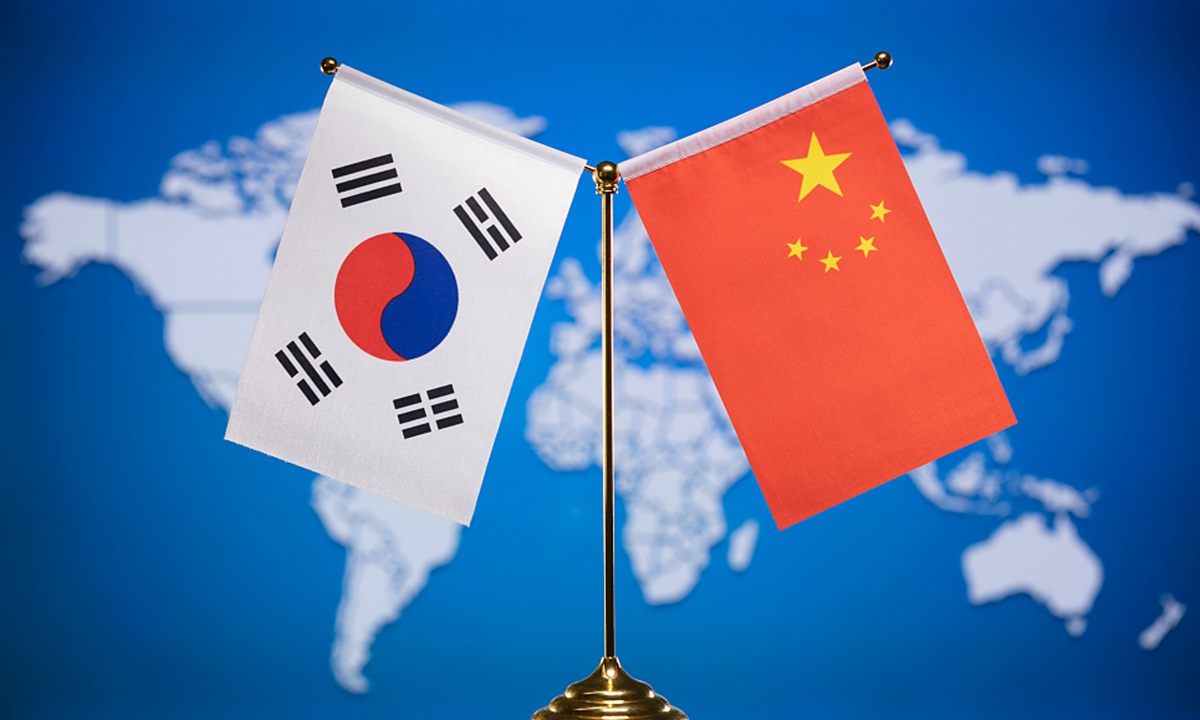Chinese e-commerce platforms gaining increasing popularity among South Korean consumers
It’s unwise for Seoul to blindly follow US heels and contain China’s economic rise: experts

Deliverymen sort packages in an e-commerce industrial zone in Lianyungang, East China's Jiangsu Province, on June 12, 2023. Photo: VCG
Chinese e-commerce platforms are gaining increasing popularity among South Korean consumers thanks to affordable and high-quality products that are delivered rapidly. Experts said the phenomenon reflects close economic and trade ties between the two nations, adding that the South Korean government's siding with the US to contain China is set to incur heavy losses in South Korean economy.
"I recently bought several phone cases on AliExpress. It's much cheaper than buying them in South Korea," a 33-year-old Seoul-based South Korean resident surnamed Lee told the Global Times on Monday.
While many South Koreans still use local e-commerce platforms such as Coupang, Navar Shop, and Gmarket, Chinese e-commerce platforms are becoming increasingly popular among South Koreans, and AliExpress advertisements featuring famous Korean actor Ma Dong-seok can easily be seen in subway stations there, Lee said.
"Some South Koreans even use Ma's photo as AliExpress profile pictures, as they want Chinese vendors to send parcels faster," she said.
According to data released by Statista, South Korea is one of the biggest online markets in Asia Pacific, with an e-commerce market scale of $118 billion in 2022, or the equivalent of that of the whole Latin American region. In 2022, Chinese goods accounted for 27.9 percent of South Korea's cross-border e-commerce volumes, becoming an important source of South Korean people's overseas online purchases.
AliExpress, Alibaba's cross-border e-commerce platform, has been greatly optimized to adapt to South Korean consumers' taste and their shopping habits. The company's website design, for example includes a Korean language interface. In 2023, the platform announced Ma, the actor, as its brand ambassador in South Korea, and rolled out a new channel named Choice that offers quality services and on-time deliveries -- usually completed within three to five days.
The Chinese platform expanded its user base in South Korea by more than 150 percent in three years, reaching 2.9 million users as of April 2023, according to data compiled by Forbes Korea.
Fierce competition from Chinese e-commerce platforms has driven South Korean counterparts to further attract more Chinese vendors. A Chinese vendor surnamed Wang, who sells shoes and clothes on Coupang, told the Global Times that many online stores on South Korean local e-commerce platforms import goods from China.
"A major advantage for Chinese e-commerce platforms and Chinese sellers is that we provide almost all the products that people need in daily life, thanks to comprehensively integrated industrial and supply chains in China," Wang said, noting that made-in-China products such as mobile phone accessories, women clothing, and small household appliances sell well on the platform.
Additionally, South Korean consumers who buy Chinese products can now have their purchases delivered to them within three to five days, which places Chinese e-commerce platforms on a par with their Korean counterparts in terms of logistics, according to Wang.
Lee said that increasingly high commodity prices have raised living costs for the youth in South Korea, leading many to shift to quality and affordable Chinese products. "That's why many students in South Korea and landlords tend to use Chinese e-commerce platforms," she said.
Due to a sluggish semiconductor sector performance, the Bank of Korea recently announced that it has cut the country's 2023 economic growth forecast to 1.4 percent from 1.6 percent.

A visitor tries cosmetics at the South Korea pavilion during the 19th China-ASEAN Expo in Nanning, south China's Guangxi Zhuang Autonomous Region, Sept. 18, 2022.Photo:Xinhua
Inseparable neighbors
The phenomenon underscores that both China-South Korea economic and trade relationship and people-people exchanges are inseparable, despite some South Korean politicians' attempts at pushing forward "decoupling" from China by following the US' steps, Lü Chao, an expert on Korean Peninsula issues at the Liaoning Academy of Social Sciences, told the Global Times on Monday.
"After more than 30 years of economic cooperation, China and South Korea are deeply intertwined in industrial and supply chains, especially in mutually beneficial high-tech sector cooperation. China, for example, is the major market for memory chips manufactured by South Korea's Samsung Electronics and SK Hynix," Lü said.
"China and South Korea have developed close and win-win relations thanks to industrial and trade cooperation over the long term, which can be strongly felt amid the global economic slowdown," Li Tianguo, associate professor at the National Institute of International Strategy of the Chinese Academy of Social Sciences, told the Global Times on Sunday.
Although the COVID-19 pandemic, growing protectionism, and the Russia-Ukraine conflict have caused a sharp decline in global trade, trade between China and South Korea exceeded $360 billion in 2021 and 2022, surpassing the total trade between South Korea and the US, Japan, and Europe.
However, during South Korean President Yoon Suk-yeol's visit to the US in April, South Korea and the US signed a series of documents such as the US-ROK joint statement. And, the two sides agreed to enhance alliances on security, economy, technology, culture, and information.
As the Chinese and South Korean economies are highly complementary, South Korea-US tech partnership couldn't replace China-South Korea economic cooperation in the short term, Li said. "China and South Korea are inseparable neighbors and important trade partners. In the future, the two sides need to resolve external disruptions, further expand cooperation in emerging sectors, and constantly deepen economic and trade ties in order to promote prosperity for both countries and the region," he said.
If the South Korean government clings obstinately to its own ideas of leaning more toward the US and cooperates with the US to contain China in politics, economy, security and more, then the basis of friendly cooperation between China and South Korea will be seriously damaged, Lü said, noting that this will cause heavy losses in the South Korean economy and damage the long-term benefits of its people and the companies.



